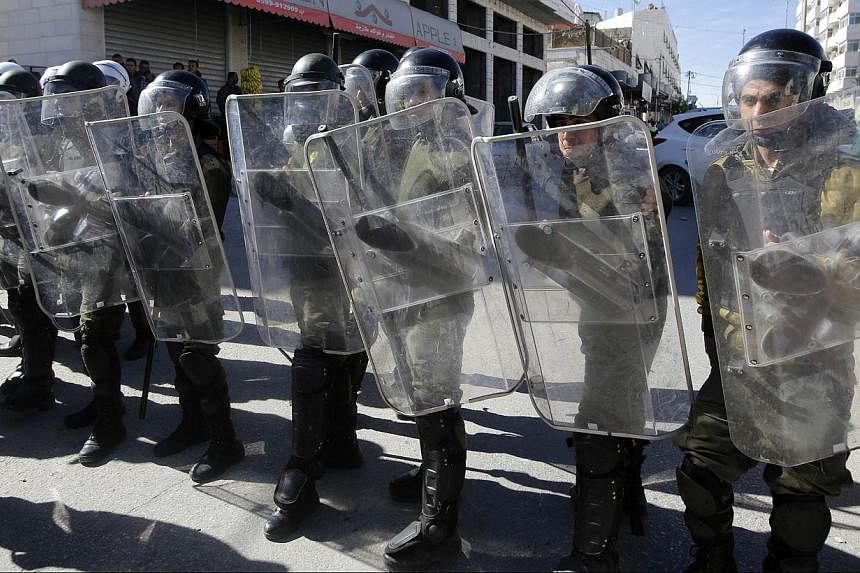JERUSALEM (AFP) - Israel deployed more than 1,300 police across troubled east Jerusalem Friday as the EU's new top diplomat warned of a fresh wave of Israeli-Palestinian violence if peace efforts remain deadlocked.
Police barred men of 35 and under from attending the main weekly Muslim prayers at the flashpoint Al-Aqsa mosque compound in the Old City, for fear of a repetition of the heavy clashes that rocked the site earlier this week.
Nightly protests have raged in Palestinian neighbourhoods over Israel's policies in east Jerusalem and anger over efforts by far-right Jewish fringe groups to secure prayer rights at the compound which is holy to Jews as well as Muslims.
Prime Minister Benjamin Netanyahu spoke by phone with Jordan's King Abdullah II to reassure him there would be no change to the decades-old status quo at the shrine which is one of the most sensitive flashpoints in the Middle East.
Jordan had recalled its ambassador to Israel in protest after Wednesday's clashes in which police faced off with Palestinian stone-throwers bent on preventing a visit by Jewish extremists.
Jordan's status as custodian of the Al-Aqsa mosque compound and other Muslim holy sites in annexed east Jerusalem is enshrined in the 1994 peace treaty between the two countries.
Concerns that Israel was set to legislate changes to the status quo have sparked weeks of unrest at the site.
As a second Israeli died from injuries sustained in a Palestinian car attack in east Jerusalem on Wednesday, Netanyahu gave orders for the homes of those who attacked Israelis to be razed.
"Last night (Thursday), at a consultation with security officials a number of possible measures to restore calm in Jerusalem were discussed," an Israeli official told AFP on condition of anonymity.
"Among those discussed was the sealing or demolition of terrorists' homes, this was approved," the official said, adding that implementation of the plan required formal justice ministry approval.
A hospital spokeswoman could not confirm details of the second victim's age or identity but Israeli media said he was a 17-year-old student at a Jewish seminary in the city.
In Wednesday's attack, a 38-year-old Palestinian from Shuafat refugee camp in east Jerusalem rammed his car into two groups of pedestrians, also killing a border police officer, before being shot dead.
It was the second such deadly attack by a Palestinian driving a car in two weeks, and triggered rioting across flashpoint areas of east Jerusalem.
"Many police and border police have been deployed throughout east Jerusalem and the Old City since the early morning to prevent disturbances," police spokeswoman Luba Samri said, putting the number at "more than 1,300".
Clashes raged into the early hours in several neighbourhoods but calm had been restored by daybreak, she said, adding that 12 people had been arrested.
The worst unrest was in Shuafat refugee camp where around 200 youths hurled rocks and firecrackers at police, who responded with tear gas, percussion grenades and sponge rounds, an AFP correspondent reported.
The European Union's new foreign affairs chief Federica Mogherini warned of a new wave of Israeli-Palestinian violence if there is no progress towards peace talks.
Speaking in Jerusalem on her first visit to the region since taking up the EU's top diplomatic post, Mogherini said there was a real "urgency" to pick up and advance the moribund peace process.
"The risk is that if we do not move forward on the political track, we will go back... again to violence," she told reporters. "That's why I see the urgency in moving forward."
But she also flagged up Israel's settlement building on lands the Palestinians want for a future state as an "obstacle" to a negotiated peace.
"New settlements are an obstacle, as we see, but we also see that there might be a political will... to resume the talks and specially (to) make sure that these talks bring to results," she said.
After a later meeting with Netanyahu, the two looked grim as they stood side-by-side at a news conference.
"I reject the fictitious claim that the root of the continuous conflict is this or that settlement," Netanyahu said and referred specifically to international criticism of settlement building in Israeli-annexed east Jerusalem.
"Jerusalem is our capital and as such is not a settlement," he insisted.

